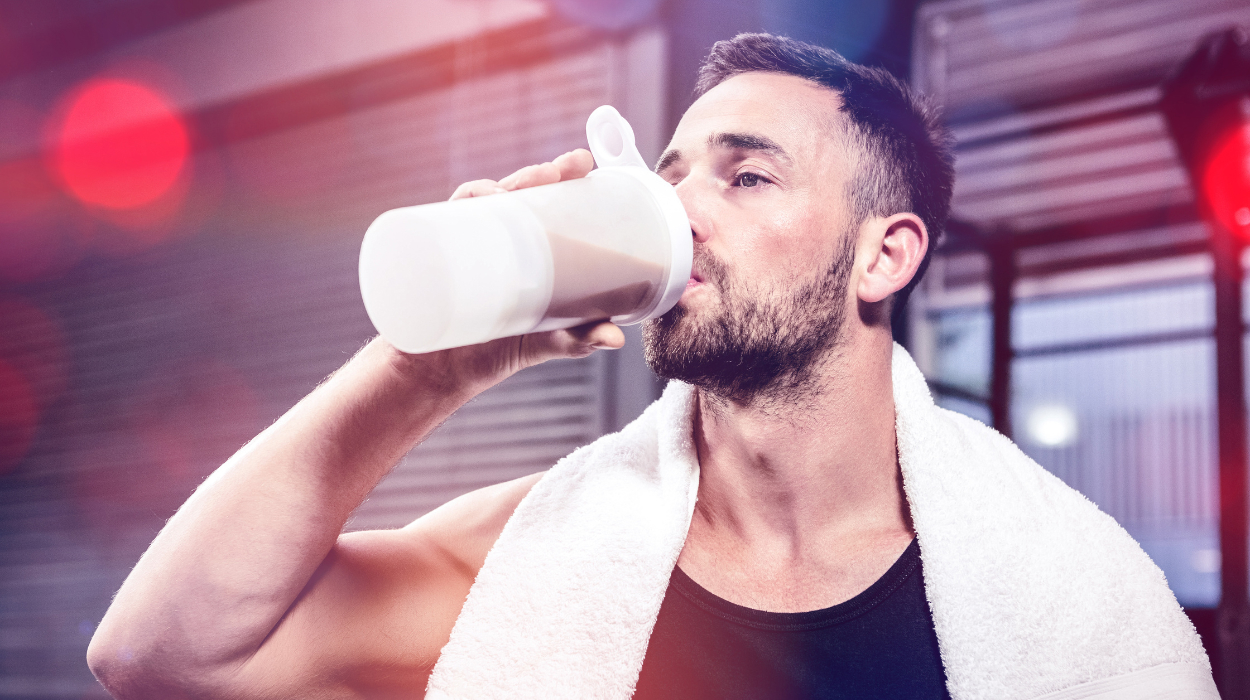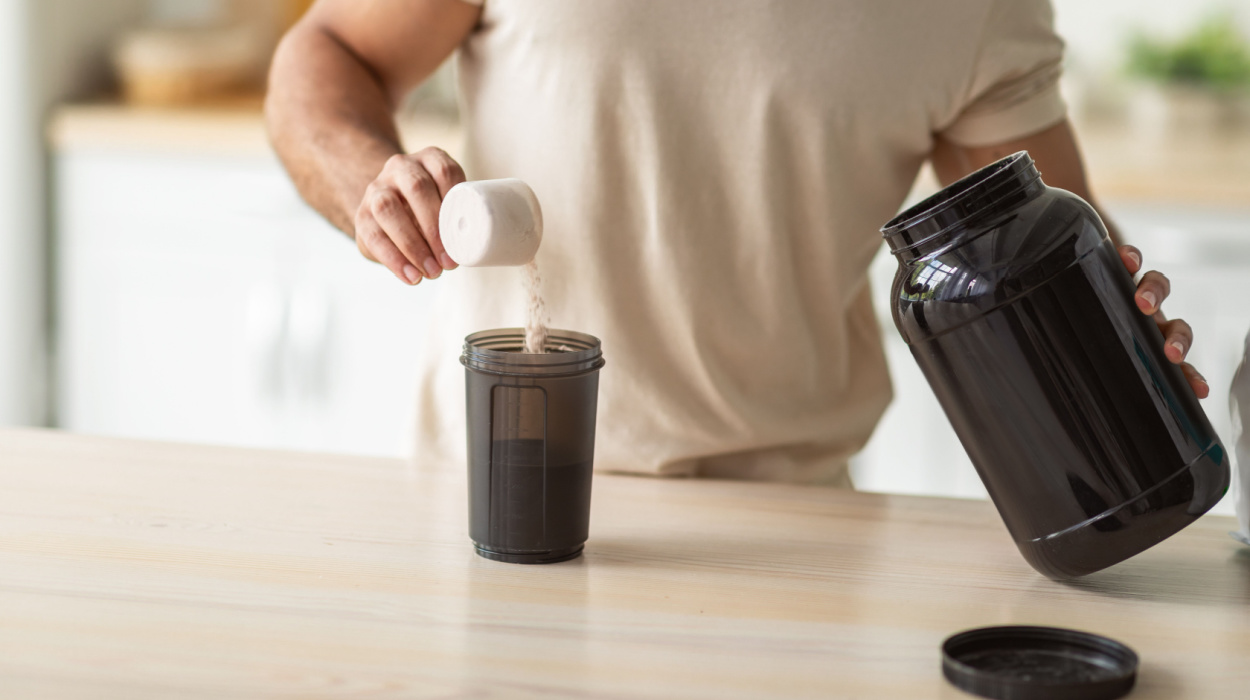Have you ever wondered why protein is important for weight loss?
While most people acknowledge the link between increased protein intake and muscle growth due to its essential amino acids, did you know that you can also use protein shakes for weight loss as well?
First and foremost, if you’re aiming to lose weight, it’s crucial to maintain a consistent caloric deficit, where your body must burn more calories than you consume.
This is where consuming protein shakes comes into play. By incorporating protein powders into your daily diet, you can achieve your weight loss goals more effectively. Protein shakes have many benefits, including increasing lean muscle, reducing hunger, and helping you maintain a healthy weight.
Is protein powder good for weight loss? If you want to learn more about the many benefits of protein shakes and how to incorporate them into your daily diet, continue reading.
Is Drinking Protein Shakes Good For Weight Loss?
It depends. Drinking protein shakes can be a great tool in weight loss by helping you limit your caloric intake while maintaining muscle mass.
How you incorporate protein shakes into your diet depends on your health goals and daily nutritional intake. When trying to lose weight, it’s important to make sure you’re maintaining a consistent yet healthy caloric deficit.
Are Protein Shakes Good For Weight Loss?

Protein is an essential nutrient that has numerous benefits. Research shows that protein plays a key role in weight loss, preserving lean muscle mass, and creating a sustained feeling of fullness or satiation.
Healthy Weight Loss
Clinical trials[1] have found that incorporating a higher protein diet, accounting for 30%-35% of total calories, can result in weight loss, improved body composition, and reduced risk of cardiovascular disease.
Weight loss fundamentally relies on achieving a caloric deficit. Protein shakes can contribute to this caloric deficit by providing essential nutrients, mainly protein, without adding excessive calories.
If you’re worried about how many calories your protein shake has, you can easily check the label or calculate it based on the ingredients you use. The great thing about high protein shakes for weight loss is that you can adjust them based on your goals and dietary needs.
Preserving Lean Muscle Mass
A common concern of those looking to lose weight is the fear that they will experience muscle loss as a side effect. The appropriate use of protein shakes is not only good for losing weight but also for maintaining strength and muscle mass.
Muscle tissue is known to be more metabolically active as compared to fat tissue. This means that even when you are resting, muscle tissue can burn more calories. Therefore, having a good amount of lean muscle mass can increase your resting metabolic rate. Additionally, a high-protein diet[2] combined with exercise can help maintain lean muscle mass and stimulate fat loss.
Protein shakes are highly versatile, and depending on how you use them, they can be good for weight loss or weight gain. The important thing to keep in mind is how they contribute to your current caloric intake.
Satiation
According to recent research,[3] the recommended daily amount of protein is approximately 1.2-1.5g/kg. If you are currently struggling to ingest enough protein, incorporating protein shakes into your daily routine might be helpful.
Studies indicate that increasing protein intake can make individuals who are overweight feel fuller or more satiated, making it easier to consume fewer calories throughout the day. Therefore, adding a protein shake as a snack can be an effective way to aid in your weight loss journey without the need for diet pills.
How To Use Protein Shakes For Weight Loss

In order to use protein shakes for weight loss, it’s important that you use them as a healthy supplement to your diet and not to replace your intake of whole foods entirely.
The great thing about protein powders is that they are convenient, versatile, and relatively affordable. You can use them as a pre-workout shake, post-workout supplement, or as a high-protein snack to curb your hunger.
For post-workout shakes, choose your favorite protein powder with your choice of milk. You can use the following recipes to prepare healthy protein shakes for weight loss:
Greek Yogurt Protein Shake
Ingredients:
- One scoop of a plant-based protein
- One cup of unsweetened coconut or almond milk
- ½ cup of Greek yogurt
- ½ cup of mixed frozen berries
- One banana
- 1 tablespoon of chia seeds
Instructions:
In a blender, combine the plant-based protein powder, coconut milk, Greek yogurt, frozen berries, banana, and chia seeds. Blend for 45 seconds or until well mixed. Adjust the thickness by adding more or less coconut milk. Pour into a cup and enjoy!
Variations:
You can replace the berries with mango or pineapple instead to add a tropical twist to your smoothie.
If you’re looking for a high-protein snack that has a bit more calories, then here is a protein-rich meal replacement idea:
Avocado Banana Protein Shake
Ingredients:
- 1 scoop of whey protein powder
- 1 cup of unsweetened almond milk
- ½ ripe avocado
- 1 medium-sized banana
- 1 tablespoon of almond butter
- ½ teaspoon of cinnamon
- Ice cubes (optional)
Instructions:
In a blender, add the protein powder and almond milk. Scoop out the avocado and add it to the blender. Add your peeled banana mix to your almond butter and sprinkle some cinnamon. If you prefer a colder shake, you can add some ice cubes. Blend all the ingredients until smooth and creamy. Finally, adjust the thickness by adding more almond milk if needed.
This shake combines the creaminess of avocado with the sweetness of the banana and cinnamon, offering a filling and delicious meal replacement option.
Chocolate Peanut Butter Banana Protein Shake
Ingredients:
- 1 scoop of plant-based protein powder
- 1 ripe banana
- 1 tablespoon of cacao powder
- 1 tablespoon of natural peanut butter
- 1 cup of almond milk
- Ice cubes (optional)
Instructions:
In a blender, add the plant-based protein powder, cacao, banana, peanut butter, and almond milk. Blend the ingredients until you achieve a smooth and creamy consistency. Add ice cubes if you prefer a thicker shake and blend again until well mixed. Pour the shake into a glass and enjoy this protein-rich snack. Feel free to use this as either a post-workout shake or as a filling meal replacement.
Considerations
Try to use protein powders without added sweeteners, colors, or flavors, and choose a protein powder with a straightforward ingredient list. If possible, opt for healthier alternatives like stevia, monk fruit, or cocoa.
Allergies
Be mindful of common allergens. If you have allergies or sensitivities, ensure that your protein powder is free from gluten, dairy, soy, or other allergens that may affect you. Most whey proteins, for example, contain lactose, so if you’re someone who is typically sensitive to lactose, it’s something to keep an eye on.
Plant Versus Whey Protein
Plant-based proteins can be a good alternative to classical whey protein, and studies have shown that there is no significant difference[4] in fitness outcomes looking at strength or lean muscle mass between the two. It is important to note, however, that plant-based proteins are associated with antinutrients,[4] which are natural substances produced by plants that can interfere with digestion or the uptake of nutrients.
Whey protein powder is a complete protein,[5] meaning it contains all the essential amino acids, whereas plant sources generally lack one or more essential amino acids. There are three main forms of whey protein:
- Whey protein powder: Often used in products other than sports supplements, such as additives in snacks, breads, dairy, or beef. This form contains the lowest concentration of protein.
- Whey protein concentrate: Uses a processing method to remove water, lactose, and other minerals in order to increase protein content.
- Whey protein isolate: The purest source of protein, with a concentration of 90% or higher. However, these options undergo more processing steps than whey concentrate and tend to be more expensive due to their purity.
Choosing between whey or plant protein largely depends on your dietary preferences or allergies. Both can be excellent sources of protein, and it is a matter of finding what works best for you.
Serving Size
Another characteristic to keep in mind is the amount of protein per serving. Some protein powders add excessive fillers, reducing the overall protein concentration. A higher protein-to-calorie ratio is generally more efficient. Studies have shown[6] that a range of 20-30 grams of protein per serving is ideal for muscle protein synthesis, and higher dosages have no added benefit.
When To Drink Protein Shakes For Weight Loss
The timing of protein[7] intake does not seem to influence the results of weight loss. Instead, consistency in maintaining a well-rounded diet and incorporating an exercise regimen into your weekly schedule is paramount. Protein shakes can serve as a good breakfast option for those looking to kickstart their metabolism in the morning. You can also use them after your workout to aid in muscle recovery.
What time you drink your protein shake ultimately comes down to personal preference and what is the most convenient for you.
Conclusion
Incorporating protein shakes into your diet can be a helpful way to increase your protein intake, build lean muscle mass, and promote weight loss. To make the most of protein shakes, be sure to use them as a supplement to high-quality, nutritious foods. Additionally, regular exercise is key to developing a healthy and sustainable weight loss plan. By combining these strategies, you can establish a consistent and effective approach to reaching your weight loss goals.
Frequently Asked Questions
The majority of your meals should come from nutrient-dense and whole foods. While you can occasionally use protein shakes as a meal replacement, it’s still important to have a well-balanced diet consisting of whole foods, vegetables, and fruits.
It’s not about the number of protein shakes you consume, but rather the number of calories you consume daily if you want to lose weight.
Your body’s metabolism and muscle tissue naturally burn fat. However, when combined with exercise, this can help you lose body fat more efficiently.
The daily recommended amount of protein intake is approximately 1.2-1.5 g/kg. However, studies have shown that high protein diets of 30%-35% of your total calories can contribute to weight loss.
It’s generally safe to consume protein shakes daily. However, you should not use them as a permanent replacement for whole foods. It’s still vital to have a well-balanced diet of fruits, vegetables, and lean protein.
 Expert's opinion
Expert's opinion
